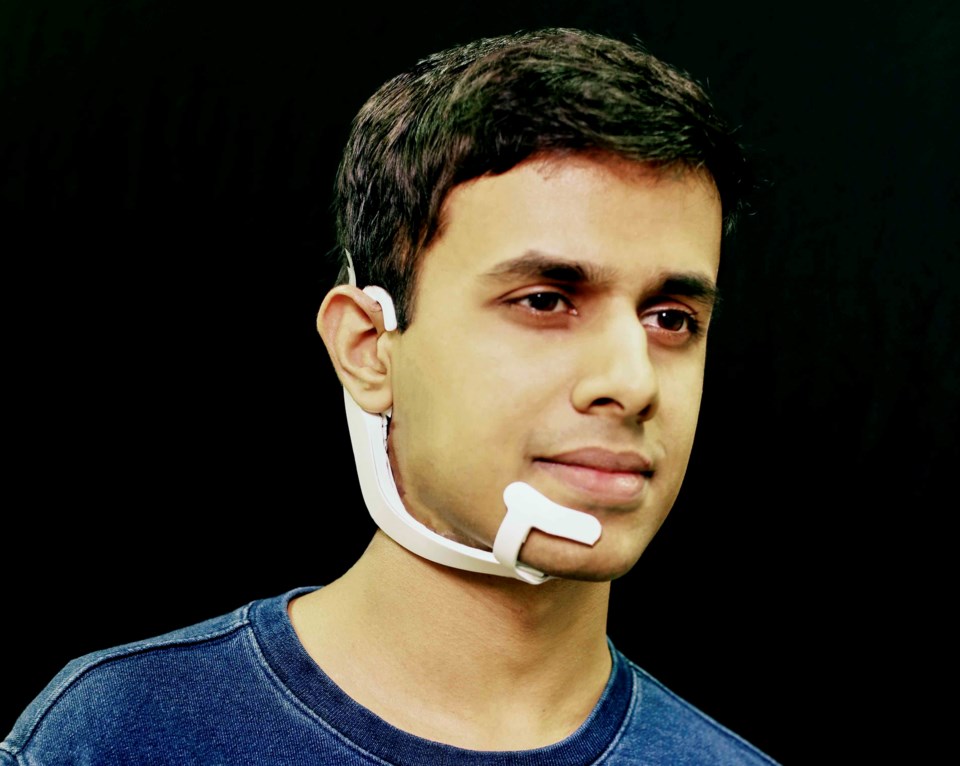A new device called AlterEgo supposedly allows people to communicate purely by thought.
Let’s say you have a man and woman wearing the device. It looks like a telephone headset, with the active end strapped under the mouth and a hook around the ear to hold it in place.
Without speaking out loud, the man says to himself: “What’s the weather in Vancouver?” The woman replies: “It’s 15 degrees and rainy here in Vancouver.” This actual interchange was demonstrated at an American trade show.
How does it work? Not quite as advertised.
The device picks up tiny muscle movements that occur in the tongue as you speak to yourself.
It then transmits these to the listening device, which vibrates the inner-ear drum of the receiving person. To the latter, these vibrations translate as sound. She hears the sender’s silent speech in her head.
This isn’t thought transference. It isn’t some kind of Vulcan mind meld. It’s simply a way of monitoring minute muscle movements.
Yet that in itself is a breakthrough of sorts. For it portends an entirely new front in artificial intelligence.
Computers can already respond to commands spoken out loud. Why not commands spoken silently?
With devices such as AlterEgo it becomes imaginable, not far in the future, that we could talk to our computer without ever speaking or writing a word. And likewise, the computer will respond in an eerily silent manner.
Why should this concern us? From the earliest times, humans used the spoken or written word to communicate.
When it come to expressing our inner thoughts, we have always relied on speech to get our views across. And this is more than a matter of convenience.
Conversation creates a social bond, so much so that we take it for granted. As the old saying goes: “By words we learn thoughts, and by thoughts we learn life.”
But what if there are no words, or at any rate, no words discernible by another?
Once computers reach the point where we can interact with them silently, all that changes.
It will start innocently enough. We frame a query silently, and the computer responds, also silently.
But what if it begins to finish our thoughts for us, or to rephrase them in more polished language?
We already have Google prompting us with options before we finish typing our query. Why not a computer rephrasing our inner dialogue for us?
It has long been evident that the rise of social media, such as Facebook and Twitter, has diminished the amount of direct human interaction.
We sit in the basement looking at a screen and imagine we have a relationship with someone we’ll never meet.
This has already weakened some of the most fundamental bonds, such as boy meets girl. They no longer need to. It can all be done via the internet.
AlterEgo, installed in a smart machine, threatens an even more disruptive chemistry. It renders obsolete our need for precision of language.
The computer will do it for us.
Martin Luther King Jr. altered the course of American history by the power of his words: “I have a dream … ,” not the power of his thoughts.
But like any other skill, verbal communication requires practice. Yet if we spend increasing amounts of time with a computer that finishes our thoughts for us and then reframes them more elegantly, what happens to that skill?
Doesn’t it suffer the kind of depletion that social media have already inflicted?
There are historical analogies. Once upon a time, nearly every woman could sew. Now few can, at least with any degree of precision. Why bother: Our clothes come ready-made.
Likewise, men could track an animal and hunt. Now scarcely any can: You get your meat at the supermarket.
History is full of lost skills, as mechanization took over.
Is the power of effective speech next in line, as smart machines begin to own our thoughts?



